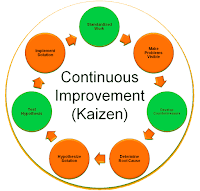Kaizen:
Kaizen (Japanese for "change for the better" or "improvement", the English translation is "continuous improvement", or "continual improvement.").Kaizen is a daily activity whose purpose goes beyond improvement. It is also a process that, when done correctly, humanizes the workplace, eliminates hard work (both mental and physical), and teaches people how to do rapid experiments using the scientific method and how to learn to see and eliminate waste in business processes.
Ten Basic Rules to Kaizen:
1. Discard conventional rigid thinking about production.
2. Think of how to do it, not why it cannot be done.
3. Do not make excuses. Start by questioning current practices.
4. Do not seek perfection. Do it right away even if for only 50 percent of target.
5. Correct mistakes at once.
6. Do not spend money for kaizen.
7. Wisdom is brought out when faced with hardship.
8. Ask "Why?" 5 times and seek the root cause.
9. Seek the wisdom of ten people rather than the knowledge of one.
10. Remember the opportunities for kaizen are infinite.
Managers have to be commited for this to work.









0 Comments